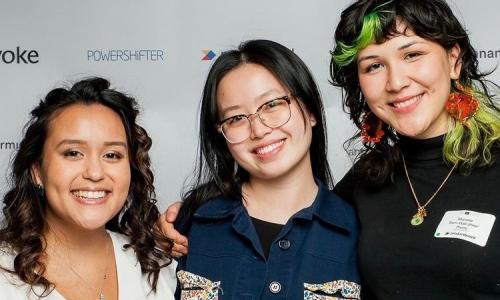
I am a very socially anxious person. Class presentations, meeting with professors, and even calling the dentist’s office to schedule my annual cleaning makes my palms sweat. Parties at which I don’t know anyone are spent with the hostess’ dog. Don’t even get me started about job interviews: once, before an interview for a chain restaurant, I had to sit out on the curb with my head between my knees, trying not to hyperventilate.
Fortunately, though, I’m getting better. I’ve pushed myself to pursue volunteer opportunities on-campus, and I’m studying abroad this summer—something I never would have even considered a year ago. I might never get over my shyness entirely, but I don’t have to let my inhibitions get in the way of my personal and professional goals.
Here are some hacks that have helped me conquer my shyness.
1. Practice Public Speaking.
Frankly, I wouldn’t take a public speaking class even if you offered to pay off every penny of my student loans. Some people might benefit from taking public speaking classes, but the stress just wouldn’t be worth it for me. I practice my public speaking skills by taking baby steps, like volunteering to read passages aloud in class.
2. Prepare a mental list of conversation starters.
People who are able to throw themselves into social situations without any preparation whatsoever amaze me. I feel most comfortable when I have at least a few conversation topics up my sleeve. School and hobbies are good (albeit uncreative) subjects, because they encourage people to rave about what they love. I’ve learned that when the person I’m talking to is relaxed, I feel more relaxed.
3. Take Advantage of Social Media.
Introverts of the past would hate us modern-day introverts if they knew of the opportunities we had now. Employers are hiring prospective employees from professional social networking sites like LinkedIn. Entrepreneurs are able to launch and promote their businesses through Twitter, Facebook, Instagram, Four Square, and countless other social media platforms. Anyone who has access to a computer can start a blog, which can serve as a catalyst for whatever profession you are pursuing. There is even a whole new industry of social media jobs! There is truly no better time for us to be alive.
4. Focus on Your Strengths.
One of my greatest pet peeves is the widespread belief that shy people are weak. Shy people might be weak in some areas, but like all human beings, we do have strengths in others. Because I lack an outgoing personality, I focus on “upselling” my positive traits: my diligence, creativity, and ability to think critically. I also make sure to note on my resume that I am a people-person. I may not be the most graceful conversationalist, but I love people—observing them, meeting them, and collaborating with them. As a writer and social justice advocate, people are actually one of my biggest passions.
5. Worry About What You’re Saying Instead of How You’re Saying it.
This is a challenging skill for most self-conscious people to master. When I’m nervous, I tend to obsess over the phrasing of my sentences and trying not to stutter. Whenever I do manage to focus on the actual message I want to communicate, my words come out much more comfortably. This is easier to achieve when I wait a beat to respond and speak slowly, instead of rushing through my sentences to “get it over with.” Using hand gestures also helps me build confidence in what I am saying.
6. Smile and Make Eye Contact.
Shy people are sometimes misinterpreted as snobby or aloof. I make a point to smile and make eye contact. Even if my mind goes blank, a genuine smile and a clear, friendly voice will establish a good impression from the get-go.
7. Pay Attention to Confident, Charismatic People.
I find that I’m not so much drawn to talkative people as I am drawn to people who are warm in character, thoughtful in their words, and responsive to what others are saying. I think that the key to being a “people-person” isn’t the ability to chat someone’s ear off, but the ability to be engaged—to listen.
8. Enjoy Yourself.
Really, even the professional world isn’t as serious as it seems. We’re all human beings! I work with a lady whose crazy laugh makes me feel glad to be at my job. Approaching every situation with good humor makes every avenue of life that much more fun. Ultimately, my success isn’t dependent on how articulately I phrase an interview answer or my aptitude with small talk. For me, it’s about pursuing what I love and creating positive change.
This blog post is my first step. What’s yours?
![]()














